|
 Secure Site
Secure Site
|
 |
Archive for the 'Zen Timepiece by Now & Zen' Category
 Yoga Clocks and Timers by Now & Zen, Inc. YOGA FOR BEDTIME
Need help sleeping? Doing yoga exercises before bedtime can be just what you need
Sit up in bed comfortably, either with your legs folded or straight in front of you; whatever you can do with the most ease. Sit up and lean slightly back on your pillows or backboard. Close your eyes and rest your hands on your thighs and just breathe here for a few minutes. This doesn’t have to be a serious meditation but just a short while to do nothing but breathe.
Need a Yoga & Meditation timer? Get the natural one: A Bowl-Gong Bamboo Zen Timepiece from Now & Zen
Spiritual practices such as meditation or yoga are best done in an environment of beauty and tranquility. And the clock/timer you use for your practice can make a real difference in creating such an environment. But using a timer with artificial “beeps,” or even “recorded gongs,” coming out of a plastic box can be less than ideal. The Bamboo Zen Timepiece is unlike any other meditation timer on the market because it features a real, natural, acoustic, long-resonating gong, produced by its traditional Japanese style bowl-gong, or “rin-gong”. Moreover, The Zen Timepiece is made with sustainable natural bamboo, so it is as beautiful to see as it is to hear. Once you use a Zen Timepiece, nothing else will do.
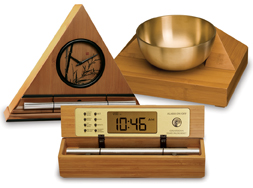 Yoga & Meditation Timer and Clocks Now & Zen – The Yoga Clock & Timer Store
1638 Pearl Street
Boulder, CO 80302
(800) 779-6383
Posted in Bamboo Chime Clocks, Meditation Timers, Meditation Tools, mindfulness practice, Well-being, Yoga Timer, Yoga Timers by Now & Zen, Zen Alarm Clock, Zen Timepiece by Now & Zen, Zen Timers
 Gong Meditation Timers - The Zen Alarm Clock can effect your awareness in a variety of positive ways, all of which require your participation (HealthDay News) — Meditation can take many forms, including the art of deep breathing. It’s a great way to relieve stress.
The American Academy of Family Physicians offers these steps to deep breathing, which helps your body get plenty of oxygen:
Lie on your back on a flat surface.
- Rest one hand on your stomach above your belly button, and the other hand on your chest.
- Breathe in slowly and deeply, making your stomach rise a bit. Hold for a second.
- Slowly exhale, so that your stomach goes back down.
- Set Your Zen Timepiece with Gong to repeat every 2 minutes.
- Repeat several times.
adapted from abcnews.com by By Diana Kohnle
Meditation is generally an inwardly oriented, personal practice, which individuals do by themselves. Meditation may involve invoking or cultivating a feeling or internal state, such as compassion, or attending to a specific focal point. The term can refer to the state itself, as well as to practices or techniques employed to cultivate the state. There are dozens of specific styles of meditation practice; the word meditation may carry different meanings in different contexts. Meditation has been practiced since antiquity as a component of numerous religious traditions. A 2007 study by the U.S. government found that nearly 9.4% of U.S. adults (over 20 million) had practiced meditation within the past 12 months, up from 7.6% (more than 15 million people) in 2002.
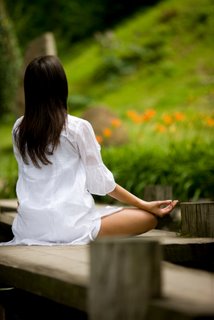 Meditation - The Zen Alarm Clock is a consciousness-raising tool.
Although meditation can be done in almost any context, practitioners usually employ a quiet, tranquil space, a meditation cushion or bench, and some kind of timing device to time the meditation session. Ideally, the more these accoutrements can be integrated the better. Thus, it is conducive to a satisfying meditation practice to have a timer or clock that is tranquil and beautiful. Using a kitchen timer or beeper watch is less than ideal.
And it was with these considerations in mind that we designed our Zen Alarm Clock and practice timer. This unique “Zen Clock” features a long-resonating acoustic chime that brings the meditation session to a gradual close, preserving the environment of stillness while also acting as an effective time signal.
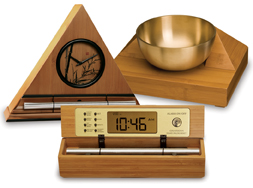 Use our unique "Zen Clock" which functions as a Yoga Timer. It features a long-resonating acoustic chime that brings your meditation or yoga session to a gradual close, preserving the environment of stillness while also acting as an effective time signal.
Now & Zen
The Gong Meditation Clock Shop
Downtown Boulder, Colorado
1638 Pearl Street
Boulder, CO 80302
(800) 779-6383
Posted in Meditation Timers, mindfulness practice, Zen Timepiece by Now & Zen, Zen Timers
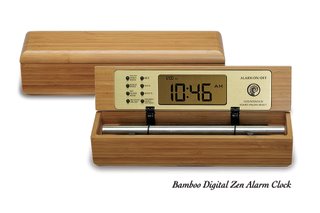 stillness practice tools and timers …that he washes dishes with as much care as he would if he were bathing the newborn Buddha: “If I am incapable of washing dishes joyfully, if I want to finish them quickly so I can go and have a cup of tea, then I will be incapable of drinking the tea joyfully.”
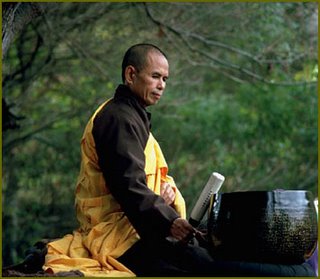 Thich Nhat Hanh Now & Zen – The Gong Meditation Timer Shop
1638 Pearl Street
Boulder, CO 80302
Posted in Bamboo Chime Clocks, zen monks, Zen Timepiece by Now & Zen, Zen Timers
 Re-wire Your Brain for Happiness - Choose a Meditation Timer with Chime A quiet explosion of new research indicating that meditation can physically change the brain in astonishing ways has started to push into mainstream.
Several studies suggest that these changes through meditation can make you happier, less stressed — even nicer to other people. It can help you control your eating habits and even reduce chronic pain, all the while without taking prescription medication.
Meditation is an intimate and intense exercise that can be done solo or in a group, and one study showed that 20 million Americans say they practice meditation. It has been used to help treat addictions, to clear psoriasis and even to treat men with impotence.
The U.S. Marines are testing meditation to see if it makes more focused, effective warriors. Corporate executives at Google, General Mills, Target and Aetna Insurance, as well as students in some of the nation’s classrooms have used meditation.
Various celebrities also are known meditators, including shock jock Howard Stern, actors Richard Gere, Goldie Hawn and Heather Graham, and Rivers Cuomo, the lead singer of the band Weezer.
In one study, a research team from Massachusetts General Hospital looked at the brain scans of 16 people before and after they participated in an eight-week course in mindfulness meditation. The study, published in the January issue of Psychiatry Research: Neuroimaging, concluded that after completing the course, parts of the participants’ brains associated with compassion and self-awareness grew, and parts associated with stress shrank.
Recently, the Dalai Lama granted permission for his monks, who are master mediators, to have their brains studied at the University of Wisconsin, one of the most high-tech brain labs in the world.
Richie Davidson, a PhD at the university, and his colleagues, led the study and said they were amazed by what they found in the monks’ brain activity read-outs. During meditation, electroencephalogram patterns increased and remains higher than the initial baseline taken from a non-meditative state.
But you don’t have to be a monk to benefit from meditation, which is now gaining acceptance in the field of medicine.
 The Most Soothing Meditation Timer and Clock with Chime Physicians have increasingly started prescribing meditation instead of pills to benefit their patients. A Harvard Medical School report released in May found that more than 6 million Americans had been recommended meditation and other mind-body therapies by conventional health care providers.
Perhaps the most mind-bending potential benefit of meditation is that it will actually make practitioners nicer. Chuck Raison, a professor at Emory University, conducted a meditation study in which he hooked up microphones to participants who had been taught basic meditation and those who hadn’t. He then recorded them at random over a period of time. Raison found that these newly-trained mediators used less harsh language than people who had no meditation experience.
“They were more empathic with people,” Raison said. “They were spending more time with other people. They laugh more, you know, all those things. They didn’t use the word ‘I’ as much. They use the word ‘we’ more.”
However, even the Dalai Lama admitted that meditation is not the silver bullet cure-all for every ailment or emotion.
“Occasionally, [I] lose my temper,” he said. “If someone is never lose temper then perhaps that may come from outer space, real strange.”
The Dalai Lama also cautioned that meditation takes patience, so new mediators should not expect immediate results.
“The enlightenment not depend on rank,” he said, laughing. “It depends on practice.”
Some scientists believe that in a generation, Americans will see meditation as being as essential to maintaining a healthy lifestyle as diet and exercise.
Although meditation can be done in almost any context, practitioners usually employ a quiet, tranquil space, a meditation cushion or bench, and some kind of timing device to time the meditation session. Ideally, the more these accoutrements can be integrated the better. Thus, it is conducive to a satisfying meditation practice to have a timer or clock that is tranquil and beautiful. Using a kitchen timer or beeper watch is less than ideal.
And it was with these considerations in mind that we designed our digital Zen Alarm Clock and practice timer. This unique “Zen Clock” features a long-resonating acoustic chime that brings the meditation session to a gradual close, preserving the environment of stillness while also acting as an effective time signal.
adapted from worldnewsreport.com by Maggy Patrick and Lauren Effron
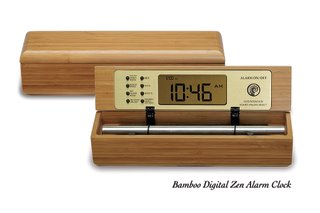 The Most Soothing Meditation Timer and Clock with Acoustic Chime Now & Zen – The Meditation Timer Store
1638 Pearl Street
Boulder, CO 80302
(800) 779-6383
Posted in Meditation Timers, Meditation Tools, Now & Zen Alarm Clocks, Zen Alarm Clock, Zen Timepiece by Now & Zen, Zen Timers
 Meditation Affects Your Body - Set Your Gong Meditation Timer It turns out peaceful thoughts really can influence our bodies, right down to the instructions we receive from our DNA, according to a new study.
Researchers for the study, published in the Public Library of Science, took blood samples from a group of 19 people who habitually meditated or prayed for years, and 19 others who never meditated.
The researchers ran genomic analyses of the blood and found that the meditating group suppressed more than twice the number of stress-related genes — about 1,000 of them — than the nonmeditating group.
The more these stress-related genes are expressed, the more the body will have a stress response like high blood pressure or inflammation. Over long periods of time, these stress responses can worsen high blood pressure, pain syndromes and other conditions.
The nonmeditating group then spent 10 minutes a day for eight weeks training in relaxation techniques that involved repeating a prayer, thought, sound, phrase or movement.
“What this does is to break the train of everyday thought — you no longer have stressful thoughts and because of that the body is able to return to a healthy state,” said Dr. Herbert Benson, director emeritus of the Benson-Henry Institute Mind/Body Medicine and an associate professor of medicine at Harvard Medical School.
By the end of the training, the novice meditating group was also suppressing stress-related genes, although at lower levels than those of the long-term meditating people.
Meditation in the Genes
“In the old days, we thought the mind didn’t affect the body,” Benson said. “In truth, it’s breaking down the very old rule.”
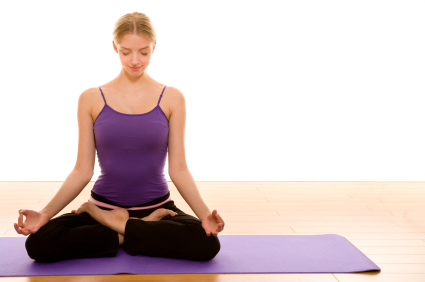 Gong Meditation Timers Have Soothing Acoustic Sounds Indeed, fellow mind-body researchers are finding more evidence that meditation and spiritual practices can influence the body in elemental ways.
Dr. Dean Ornish, professor of medicine and founder of the Preventive Medicine Research Institute at the University of California at San Francisco, recently found a relationship between meditation and genes in prostate cancer.
“This is an important pilot study showing that meditation alone may favorably alter gene expression in whole blood,” Ornish said. “These findings provide additional evidence to our recent study in PNAS [the Proceedings of the National Academy of Sciences] showing that meditation — when combined with better nutrition and moderate exercise — also favorably altered gene expression in prostate tissue.”
But researchers warn that only preliminary steps have been taken toward establishing a connection between genes and meditation.
“It’s on the limits of sensitivity of where we can go on genomics and proteomics,” said Towia Libermann, co-author of the study and director of the Beth Israel Deaconess Medical Center Genomics Center in Boston. “We can’t go into the brain itself, so a lot of what we do is going on in the blood.”
That difficult step from brain to blood can make research to link meditation and genetics difficult.
“Things happen, and genes get turned on or turned off — the genes make RNA, then the RNA makes proteins,” said Dr. Charles Raison, clinical director of the Mind Body Program in the department of psychiatry and behavioral sciences at Emory University in Atlanta.
Raison said it is those final proteins in the process that have a significant effect on the body, and sometimes RNA doesn’t end up making those proteins. Since genomic analysis measures only the RNA in the blood, it can’t guarantee that RNA had a specific effect on the body.
“Not everything gets down to the business end of the gun,” said Raison, who would also have liked to see more definition of what meditation means in the study as opposed to including any forms of repetitive prayer or yoga.
Future Thoughts for Study
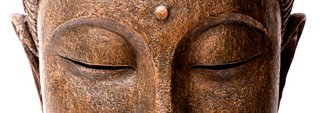 Buddha “Before you can say meditation does X, you’ve got to have a sense of what you mean by meditation,” Raison said. “There’s data to suggest that different meditative practices have different physical effects.”
Yet Raison found the stress-related study intriguing.
“The study is consistent with other lines of emerging research, including ours,” said Raison, who noted that lonely people have similar stress-related gene expression as the nonmeditating group in the study.
Another study by Dr. Richard Davidson at the University of Wisconsin found that people who were taught to meditate after a vaccination developed more antibodies to the virus than people who did not meditate afterward, Raison said.
According to Raison, it all falls in line with a modern-day misfiring of “danger pathways” that ramp up the body for fight or flight but also turn down the immune system and increase inflammation. If the meditation study proves correct, it could help stem these changes, along with exercise and diet.
“The gene changes have a lot to do with things that cause wear and tear on the body and the brain,” said Raison. “Diabetes, cardiovascular disease, dementia, many diseases in the modern world are linked to this sort of wear and tear.”
The researchers in the stress study would like to next focus on these types of individual diseases.
“If you’re about to be torn apart by a tiger, these stress responses are adaptive,” Raison said. “But if my boss is yelling at me every morning, these ancient responses are activated, but they are not useful.”
adapted from abcnews.com by Lauren Cox
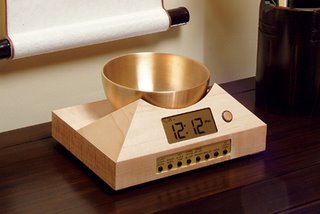 Gong Meditation Timers for Your Stillness Practice Although meditation can be done in almost any context, practitioners usually employ a quiet, tranquil space, a meditation cushion or bench, and some kind of timing device to time the meditation session. Ideally, the more these accoutrements can be integrated the better. Thus, it is conducive to a satisfying meditation practice to have a timer or clock that is tranquil and beautiful. Using a kitchen timer or beeper watch is less than ideal. And it was with these considerations in mind that we designed our digital Zen Alarm Clock and practice timer. This unique “Zen Clock” features a long-resonating acoustic chime that brings the meditation session to a gradual close, preserving the environment of stillness while also acting as an effective time signal.
It’s exquisite sounds summon your consciousness out of your meditative state with a series of subtle gongs. Once you experience the Zen Timepiece’s progressive tones, you’ll never want to meditate any other way. It serves as the perfect meditation timer. Available in 5 wood styles, including bamboo.
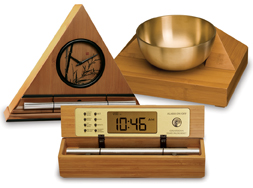 Bamboo Gong Meditation Timer and Chime Clocks Now & Zen – The Gong Meditation Timer Shop
Downtown Boulder
1638 Pearl Street
Boulder, CO 80302
(800) 779-6383
Posted in Well-being, Yoga Timer, Zen Timepiece by Now & Zen, Zen Timers
 Soothing Gong Meditation Timers - It's exquisite sounds summon your consciousness out of your meditative state with a series of subtle gongs. (HealthDay News) — There are many forms of mediation, most of which are rooted in ancient tradition.
For many people, it’s a great way to relax and soothe stress.
Here’s a summary of meditation’s common principles, courtesy of the U.S. National Institutes of Health’s National Center for Complementary and Alternative Medicine:
- Find a quiet place with little sound or distracting activity.
- Find a position that’s comfortable for you, including sitting, lying down, walking or standing.
- Focus completely on meditation, which in practice may include repeating a word or phrase, focusing mentally on an object or focusing on breathing in a certain way.
- Have an open mind and learn to acknowledge life’s distractions without necessarily judging or acting on them.
- Set your Gong Meditation Timer for 20 minutes and relax.
adapted from abcnews.com by By Diana Kohnle
Although meditation can be done in almost any context, practitioners usually employ a quiet, tranquil space, a meditation cushion or bench, and some kind of timing device to time the meditation session. Ideally, the more these accoutrements can be integrated the better. Thus, it is conducive to a satisfying meditation practice to have a timer or clock that is tranquil and beautiful. Using a kitchen timer or beeper watch is less than ideal.
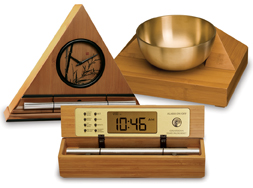 Gong and Chime Meditation Timers and Clocks
And it was with these considerations in mind that we designed our Zen Alarm Clock and practice timer. This unique “Zen Clock” features a long-resonating acoustic chime that brings the meditation session to a gradual close, preserving the environment of stillness while also acting as an effective time signal.
The Zen Clock can be programmed to chime at the end of the meditation session or periodically throughout the session as a kind of sonic yantra. The beauty and functionality of the Zen Clock/Timer makes it a meditation tool that can actually help you “make time” for meditation in your life.
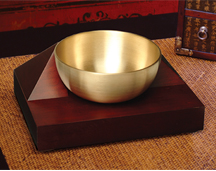 Gong Meditation Timers - preserving the environment of stillness. Now & Zen – The Gong Meditation Store
Downtown – Boulder, Colorado
1638 Pearl Street
Boulder, CO 80302
(800) 779-6383
orders@now-zen.com
Posted in Well-being, Yoga Timer, Zen Alarm Clock, Zen Timepiece by Now & Zen, Zen Timers
 Use Your Gong Meditation Timer More Often - Utamaro Ukiyoe Sharon Salzberg said her mind might be very different if it weren’t for meditation, and new neurologic research suggests that she might be right.
Troubled by a traumatic, stressful childhood, Salzberg traveled to India as a college student and discovered meditation. Not only did it help her deal with her painful past, Salzberg said, but the practice helped change the way her mind worked.
“I hadn’t really looked within,” said Salzberg, a co-founder of the Insight Meditation Society and author of seven books on meditation. “I felt much more presence, rather than being distracted. It felt like the whole world opened up for me.”
A new study from Yale University suggests that the brains of experienced meditators like Salzberg may actually work differently than brains of those who don’t meditate. The study gives scientists a window into the meditating mind, providing evidence that the practice appears to change the way the brain works and could give meditators a leg up when it comes to dealing with mental disorders.
Dr. Judson Brewer, medical director of the Yale Therapeutic Neuroscience Clinic, and his colleagues asked 10 experienced meditators and 13 people with no meditation experience to practice three basic meditation techniques: concentration, loving-kindness, and choiceless awareness.
The team then used functional magnetic resonance imaging to observe the participants’ brain activity when they were practicing the meditative techniques and when they were instructed not to think of anything in particular.
In a report published today in the Proceedings of the National Academy of Sciences, Brewer and his team report that the experienced meditators had decreased activity in an area of the brain called the default mode network, a region that is usually at work when the mind wanders. Even when the meditators weren’t meditating, this region of their brain was much quieter than in their inexperienced counterparts.
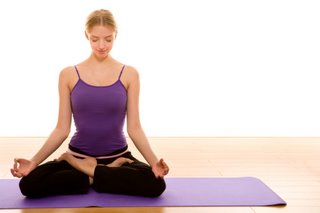 Meditation Gong Timers for Your Practice Most people spend a lot of time in mind wandering or daydreaming, and research shows that it comes with cognitive pros and cons. Scientists have shown that daydreaming can be a good thing, providing a boost for creativity, aiding in the processing of social functions, and refining other important psychological processes.
However, recent studies have suggested that a wandering mind is also an unhappy one. In 2010, one study found that people reported being significantly less happy when their minds were wandering than when they were engaged in the task at hand. Researchers suggest that this is because when our minds are wandering, most of us are worrying rather than living in the moment.
Brewer also notes that the psychological hallmark of many forms of mental illness — anxiety, depression, post-traumatic stress disorder, and schizophrenia — is a preoccupation with one’s own thoughts, specifically the negative ones. A series of studies have linked these disorders with overactivity or faulty neurological wiring in the default mode network, the brain region that was less active in experienced meditators.
“One of the things that meditation and basic mindfulness seems to be doing is quieting down this region of the brain,” Brewer said. “It absolutely makes sense, given what we know about the default mode network.”
Meditation isn’t a cure for mental illness, Brewer said, but he said his study suggests that there may be a neurological basis for the benefits that many meditators report — increased awareness, improved concentration, and a better ability to deal with the cognitive and emotional stresses of modern life.
Salzberg said she hopes that increased scientific study will continue to document the benefits of meditation for easing a troubled mind.
“It’s quite great that in our contemporary time where science is the language of validation, there’s evidence showing that in fact this is true,” Salzberg said.
adapted from abcnews.com by Carrie Gann
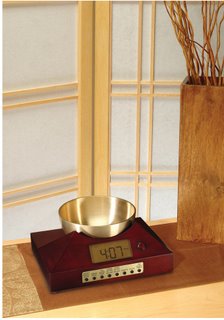 Singing Bowl - Gong Meditation Timer for Your Stillness Practice Now & Zen – The Only Gong Meditation Timer Store
1638 Pearl Street
Boulder, CO 80302
(800) 779-6383
Posted in Well-being, yoga, Yoga Timer, Zen Timepiece by Now & Zen, Zen Timers
 Meditation - Even a Little Helps - Ukiyoe - Genji Monogatari Musee Saint Remi You don’t have to be a monk.
Scientific literature is brimming with research showing that transcendental meditation literally changes the structure of the human brain, at least among persons who practice “mindfulness,” as it is sometimes called, for many years.
But new research shows that even 20 minutes a day, four days a week, can produce an impressive increase in critical cognitive skills.
“Simply stated, the profound improvements that we found after just four days of meditation training are really surprising,” psychologist Fadel Zeidan said in releasing the study. “It goes to show that the mind is, in fact, easily changeable and highly influenced, especially by meditation.”
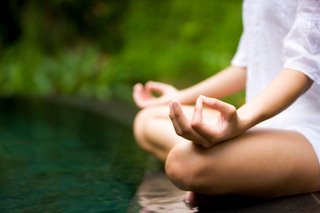 Meditation - Choose a Gong Meditation Timer for Your Practice Zeiden led the study while finishing his doctoral studies at the University of North Carolina, Charlotte. He is now a researcher at Wake Forest University School of Medicine.
Benefits Unlikely to Last Long Unless You Keep at It
If other scientists replicate his work, it means it may not be necessary to lock yourself in a closet for hours at a time to benefit from this Far Eastern therapy.
That said, however, this research does not suggest that more would not be better, and Zeidan cautioned that while a modest effort can produce big results, they are not likely to last long unless you keep it up over an extensive period of time. Like years.
And while there are many books out there explaining “do-it-yourself” techniques, the participants in the North Carolina study were trained professionally, although for a total of only 80 minutes. Those who received the training were as much as 10 times better in their ability to remain focused on a subject while retaining other information.
All 63 participants were students, and only 49 completed the experiment, suggesting this may not be as easy as it sounds. The students were divided into two groups, and all were subjected to a broad range of behavioral tests on mood, memory, visual attention, and vigilance. Then one group listened to a reading of J.R.R. Tolkein’s “The Hobbit.”
Meditation Training Was Basic Buddhist Meditation
The other group received the meditation training for an equivalent period of time.
The two groups were equal on the behavioral tests at the beginning of the experiment. Both scored about the same on mood testing in the second phase, but the students who received the meditation training scored significantly higher on cognitive tests.
In one test, students were shown an image, called a stimulus, on a computer monitor and told to identify it every time the stimulus appeared. If they got it right, the images would speed up, making it more difficult.
The students who received the meditation training averaged about 10 consecutive correct answers while the group that listened to the reading averaged only about one.
The training itself was pretty basic Buddhist meditation. Participants were told to relax, keep their eyes closed, and focus on the flow of their breath at the tip of their nose. If their thoughts strayed, they were instructed to note the thoughts, and resume concentrating on their breath.
Sounds preposterous, right? Why would something that simple change the brain?
Meditation Changes Structure of the Brain, Research Shows
 Meditation - Use a Gong Meditation Timer for Your Practice Numerous studies by very serious scientists show at least partly why it works, at least over the long haul.
— Buddhist Insight meditation, practiced 40 minutes a day, literally changed the structure of the brain, according to a study by researchers from Yale, Harvard, Massachusetts General Hospital and the Massachusetts Institute of Technology. That 2005 study was based on functional magnetic resonance imaging that showed an increase in thickness of regions of the brain that are important for sensory, cognitive and emotional processing. The changes are expected to be “long lasting,” the researchers said.
— Brain imaging at the University of Wisconsin-Madison in 2008 showed that brain circuits used to detect emotions and feelings were “dramatically changed” in subjects who had extensive experience practicing compassion meditation. That suggests we can train ourselves to be compassionate, much like we train to play a musical instrument. The participants in this study, by the way, were Tibetan monks with at least 10,000 hours of meditation.
— Can it reduce pain? Yes, according to research in London involving 12 monks with 30 years experience. Brain scans showed the monks had a 40 to 50 percent lower brain response to pain than 12 persons who had no training in transcendental meditation. But here’s the surprising finding. When the 12 untrained persons were trained for five months, they also lowered their pain response by a comparable 40-50 percent.
Continued Practice Needed for Long-Term Stable Changes
Numerous other studies have shown real physical changes ranging from enhanced immunity to a slowing of the aging-related atrophy of some areas of the brain.
So this is big stuff, but in a telephone interview Zeidan offered a few words of caution.
“By no means will four days of practice be it. This just suggests that the effect of meditation can be directly perceived and there are some short term benefits,” he said.
“We were really surprised with the findings. There are some dramatic differences in cognition, but it’s kind of like going to the gym and working on a bicep. You go to the gym four days and you might be sore, there might be some muscle strength increase, but that’s it. If you stop, your muscle is going to go back.
“So you have to continue to practice to experience more long term stable changes,” he added. But you don’t have to become a monk.
adapted from worldnewsreport.com by Lee Dye
As beautiful to see as it is to hear, the Zen Timepiece is also a decorative accessory that adds elegance to any room. Its wood platform (available in cherry or maple) is designed to be positioned either with the clock’s digital display to the front, or turned around, with the bowl-gong in the front. Although the clock looks good both ways, when the digital display is turned to the back it accentuates the clock’s natural theme and helps reduce the visual clutter of electronic modernity in one’s interior environment.
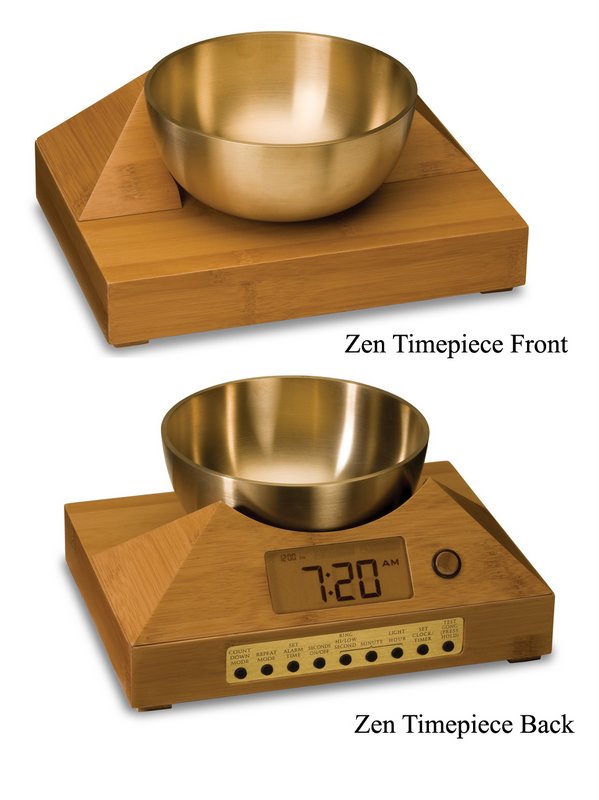 Gong Meditation Timer for Your Stillness Practice
At a suggested retail price of $199.95, it may be the world’s most expensive alarm clock, but according to Steve McIntosh, it’s definitely worth it: “Waking up in the morning is a metaphor for life, and anything that adds grace and beauty to this daily process is a good investment. When you use the Zen Timepiece it’s like waking up in a Zen temple.”
 Visit our Gong Meditation Store - Boulder, CO Now & Zen – The Gong Meditation Store
1638 Pearl Street
Boulder, CO 80302
(800)779-6383
Posted in Meditation Timers, Meditation Tools, mindfulness practice, Now & Zen Alarm Clocks, Zen Timepiece by Now & Zen, Zen Timers
 Choose a Soothing Sounds Alarm Clock - Elegant Women. Courtesy of the Japan Ukiyo-e Museum Ask yourself: What health-related effects of stress have you already noticed in your life?
If you haven’t considered (or you’ve chosen to ignore) the harmful effects that stress can have on your mind and body, you’re overlooking a major threat to your well-being.
Taking a long, hard look at the potential consequences of unrelenting, unaddressed anxiety can help us realize that we need to make a change, before it’s too late.
 Soothing Sounds Alarm Clocks and Timers with Acoustic Chimes Start a Meditation Practice:
Although meditation can be done in almost any context, practitioners usually employ a quiet, tranquil space, a meditation cushion or bench, and some kind of timing device to time the meditation session. Ideally, the more these accoutrements can be integrated the better. Thus, it is conducive to a satisfying meditation practice to have a timer or clock that is tranquil and beautiful.
Using a kitchen timer or beeper watch is less than ideal. And it was with these considerations in mind that we designed our digital Zen Alarm Clock and practice timer. This unique “Zen Clock” features a long-resonating acoustic chime that brings the meditation session to a gradual close, preserving the environment of stillness while also acting as an effective time signal.
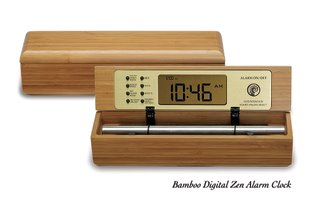 Soothing Sounds Timers and Alarm Clocks with Chime Now & Zen – The Soothing Sounds Alarm Clock Headquarter Store
1638 Pearl Street
Boulder, CO 80302
(800) 779-6383
Posted in Chime Alarm Clocks, Meditation Timers, Meditation Tools, mindfulness practice, Natural Awakening, Zen Timepiece by Now & Zen, Zen Timers
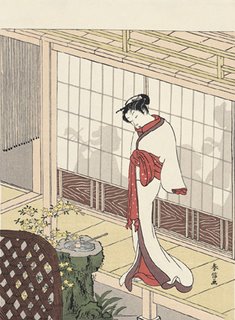 Soothing Sound Timer and Alarm Clock - Harunobu Suzuki, Beauty at the Veranda In the yogic tradition, breath is the foundation of all life, the sustaining connection between body and spirit. A telling indicator of health and mood, breath puts us in closer touch with ourselves on every level. Through pranayama, or breath control, we can manage our emotions, gain clarity — and take greater control of our lives. “The way you breathe is a metaphor for the way you live your life,” says Amy Weintraub, Kripalu yoga-teacher mentor and author of Yoga for Depression. “Are you taking little sips of breath as though you don’t deserve to take up space on the planet, or are you breathing full and standing tall?” Try this pranayama exercise once a day or whenever you need to.
Ocean-Sounding Victory Breath
This calming breath, also known as ujjayi breath, has a settling effect on the central nervous system while increasing mental alertness and clarity — making it very effective for those suffering from anxiety and depression, says Weintraub. “Even three ujjayi breaths can cause a complete paradigm shift in your mood. This is a great exercise to do before meditation or anytime to help reduce stress.”
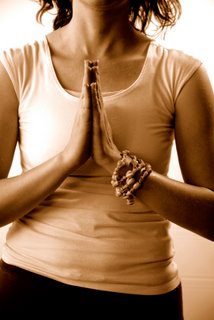 Soothing Sounds Meditation Timer and Alarm Clock with Acoustic Chime 1. Inhale through your nostrils with a slight constriction at the back of your throat so the breath travels over the glottis, making a soft but audible sound. Think ocean waves rolling over pebbles. Imagine that you are actually breathing from the back of your throat.
2. Exhale through your nostrils, pulling the belly toward your spine. Empty your lungs completely. Begin again, slowly.
3. Continue to breathe deeply and audibly on the inhalation and exhalation. Allow the belly, the rib cage, and the upper chest to expand with each inhalation. Let the breath be like a lullaby to yourself.
Use our unique “Zen Clock” which functions as a Yoga & Meditation Timer. It features a long-resonating acoustic chime that brings your meditation or yoga session to a gradual close, preserving the environment of stillness while also acting as an effective time signal.
Our Yoga Timer & Clock can be programmed to chime at the end of the meditation or yoga session or periodically throughout the session as a kind of sonic yantra. The beauty and functionality of the Zen Clock/Timer makes it a meditation tool that can actually help you “make time” for meditation in your life. Bring yourself back to balance.
adapted from body + soul, April/May 2005 Terri Trespicio
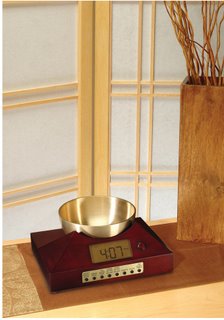 Soothing Sounds Alarm Clock and Meditation Timer from Now & Zen, Inc. Soothing Sounds Alarm Clock & Timer Store
Now & Zen, Inc.
1638 Pearl Street
Boulder, CO 80302
(800) 779-6383
Posted in Bamboo Chime Clocks, Meditation Timers, Meditation Tools, mindfulness practice, Progressive Awakening, yoga, Yoga Timer, Yoga Timers by Now & Zen, Zen Timepiece by Now & Zen, Zen Timers
« Previous Page — « Previous Entries
Next Entries » — Next Page »
|
|
|
|